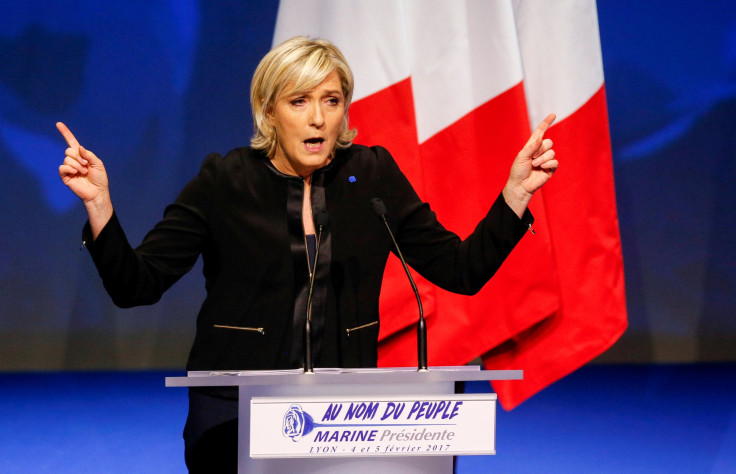A Female Trump In France? Far-Right Candidate Marine Le Pen Advances In French Presidential Polls

France’s far-right populist presidential candidate was seven points ahead of her closest rivals in the first round of the French presidential election, according to a new poll released Monday. If elected, Marine Le Pen could be a potential ally to President Donald Trump, British Prime Minister Theresa May and Russian President Vladimir Putin.
The election was set for April 23.
"Avec #Trump, avec #TheresaMay, avec #Poutine, avec le groupe de #Visegrád, je ne me sens pas du tout isolée !" #DimanchePolitique
— Marine Le Pen (@MLP_officiel) November 20, 2016
Le Pen led the “PrésiTrack” poll — conducted by the research company OpinionWay, the real estate agency ORPI Solutions Immobilieres, the radio station Radio Classique and business news publication Les Echos — with a total of 27 percent. Her closest competitors, center-right Republican candidate Francois Fillon and progressive En Marche! party candidate Emmanuel Macron, earned 20 percent support each. The results represented a 1 percentage point rise for Le Pen, while Macron and Fillon saw their respective percentages unchanged from the previous “PrésiTrack” data.
Polls for the second-round vote, in which the top two candidates of the April election go head-to-head May 7, told a different story, however. Paired with Macron, Le Pen won just 42 percent to his 58. Against Fillon, she won 44 percent, while he won 56.
The results came close to an Ifop poll, which, released Friday, gave Le Pen a likely 26 percent in the first round, compared to runners-up Macron’s and Fillon’s respective 18.5 percent totals. The poll’s second-round data forecasted Le Pen losing to Macron with 38 percent in a two-way contest, and 44 percent in a run-off against Fillon.
Le Pen has often been considered France’s own version of Trump, due to her harsh stance on immigration, her conflation of the Muslim religion with terrorism and her penchant for isolationism. She told Bloomberg in June that she would appreciate the moniker “Madame Frexit” -- a reference to her "Brexit" support for the U.K. to leave the European Union -- and, in early February, she echoed Trump’s inauguration speech with a doom-and-gloom address to supporters, detailing the “two totalitarianisms” of globalization and Islamism seeking to “subjugate France,” the New York Times reported. The Kremlin has even faced recent accusations of hacking her left-leaning rival, news that mirrored the leaks of Democratic Party Leaders' emails throughout the U.S. election by a hacking group linked to the Russian government in an attempt to damage Trump's competitor, Hillary Clinton.
Marine Le Pen: Just Call Me Madame Frexit http://t.co/XqKVPg5RdD via @business @CarolineConnan @gviscusi @HeleneFouquet
— Mathieu Rosemain (@MathieuRosemain) June 24, 2015
Some, however, believed Le Pen was a bit more restrained than her American counterpart, particularly due to her efforts to rein in the anti-Semitic reputation of her party, the Front National — started in 1972 by her Holocaust-denying father, Jean-Marie Le Pen — for the sake of a more moderate appearance.
“Ideologically, they are very similar, but one difference is communication style,” Stanford Professor of French studies Cecile Alduy told Slate Wednesday, adding that a certain air of professionalism and widespread likeability would be needed for the two-way run-off vote in May. “Trump has made his brand about political incorrectness and going against all the ethical, moral, and even linguistic taboos that used to reign in the political world. So we see misogyny, racism, you name it. However, Marine Le Pen is trying to polish the rhetorical and communications style of the National Front. Her father used to be like Trump, causing media buzz by saying something outrageous or anti-Semitic. Marine Le Pen has ironed out the rhetorical style of the National Front and wants to look presidential.”
© Copyright IBTimes 2024. All rights reserved.






















